Seduction of the Minotaur coti-5 Read online
Page 4
She would first of all lay her earrings on the table and rub her ear lobes. The rings hurt her ears, which wanted to be free. No eyes could detach themselves from this spectacle. She would remove her light jacket, and appear in a backless sundress. After breakfast, on a chaise longue on the terrace, she would lie making plans for the beach, but on this chaise longue she turned in every ripple or motion which could escape immobility. She took off her bracelets and rubbed the wrist which they had confined. She was too warm for her beach robe. By the time she reached the beach even the bathing suit had ceased to be visible to one’s eyes. By an act of prestidigitation, even though she was now dressed as was every other woman on the beach, one could see her as the naked, full, brown women of Gauguin’s Tahitian scenes.
Whoever had voted that she deserved a year to dedicate herself to the art of painting had been wise and clairvoyant.
Illogically, with Diana Fred lost his fear of women who laughed. Perhaps because Diana’s laughter was continuous, so that it seemed, like the music of the guitars, an accompaniment to their days in Golconda.
Every day Fred wanted Diana and Lillian to accompany him in his visits to the cargo ships which were to sail him home. The one that had accepted him was not ready yet. It was being loaded very slowly with coconuts, dried fish, crocodile skins, bananas, and baskets.
They would walk the length of the wharf, watching the fishermen catching tropical fish, or watching the giant turtle that had been turned on its back so that it would not escape until it was time to make turtle soup.
Watching the small ships preparing to sail, questioning the captain who wore a brigand’s mustache, the mate who wore no shirt, and obtaining no definite sailing date, the anxiety of Christmas reached its culmination.
He had something to prove to himself which he had not yet proved. He was simultaneously enjoying his adventure and constantly planning to put an end to it.
When the captain allowed him to visit the ship he would stand alone on its deck and watch Diana and Lillian standing on the wharf. They waved goodbye in mockery and he waved back. And it was only at this moment that he noticed how alive Lillian’s hair was, as if each curl were weaving itself around his fingers, how slender Diana’s neck and inviting to the hand, how full of light both their faces were, how their fluttering dresses enveloped and caressed them.
Behind them rose the soft violet mountains of Golconda. He had known intimately neither woman nor city and was already losing them. Then he felt pain and a wild desire not to sail away. He would run down the gangplank, pushing the porters to one side, run back once more to all the trepidations they caused him by their nearness.
Neither Diana nor Lillian was helping him. They both smiled so gaily, without a shadow of regret, and did not force him tostay, or cling to him. And in the deepest part of himself he knew they were helping him to become a man by allowing him to make his own decisions. That was part of the initiation. They would not steal his boyhood; he must abdicate it.
He loved them both: Diana for incarnating the spice, the color, and the fragrance of Golconda, and Lillian because her knowledge of him seemed to incarnate him, and because she was like a powerful current that transmitted life to him.
Just as he climbed the gangplank as a rehearsal for his departure, he felt then that he was not ready to leave, so when he returned to them he felt unready to live, painfully poised between crystallizations. He could not follow Diana’s invitations into the unknown, unfamiliar life of the senses, and he could not sail either.
An invisible race was taking place between Diana’s offer of a reclining nude by a Gauguin and the ship’s departure. And as if the ship, the captain, the mate, and the men who loaded it had known he was not ready to leave, one day when he went to the pier at four o’clock as he did every day, the ship was gone!
He could still see it on the horizon line, a small black speck throwing off not quite enough smoke to conceal its departure.
Lillian was walking through the market. It was like walking through an Oriental bazaar. Gold filigree from Spain, silk scarves from India, embroidered skirts from Japan, glazed potteries from Africa, engraved copper from Morocco, sculptures from Egypt, herbs and incense from Arabia. At the time Golconda was an important seaport, every country had deposited some of its riches there. When it was no longer visited, the Mexicans themselves had created variations upon these themes, adding inventions of their own.
Cages containing tropical birds were panoplied with striped awnings like the tents of ancient maharajahs. From them the Mexicans had inherited the art of training birds to pick out of their hands tiny folded papers containing predictions for the future.
Lillian gave her pennies to the man and asked for one of the messages. The bird very delicately selected, from a handful, a message that read: “You will find what you are seeking.” Lillian smiled. She wondered whether among those tiny folded papers the bird might pick up a message telling her what it was she was seeking. She decided to squander a few more pennies. But the Mexican bird trainer refused to let her try again. “It’s bad luck to question destiny twice. If it gives you two answers you will be confused.”
Beside her stood a man who was well known in Golconda as a guide. She had always disliked him. Not because she condemned his trade of selling Golconda to the spectators who could not discover it for themselves, not because she lacked sympathy for the strangers who wanted to witness others’ weddings, others’ fiestas, as paying guests, but because wherever he stood, at the hotel entrance, at the ticket agencies, at the bullfight entrance, he had the air of a pimp, a pimp who was ashamed of what he was selling, as if Golconda were not a radiant city but a package of obscene post cards. It was the suggestive way he had approached her the first time, whispering: “Would you like to attend a genuine Mexican wedding?” as though he were saying: “Would you like me to procure for you a fine young man?”
It may be that Lillian identified his yellow face, his averted eyes, and his constantly nibbling lips with prying, with the spectator, with all peripheral living. And yet, she thought, blushing, I am quite willing to seek guidance for my inward journeys. To ask of a trained bird that he should pick out of a pile of folded papers guidance for my inward journeys!
This thought caused her to look at the guide with more tolerance, and he sensed her weakening defenses. This made him take a step forward and whisper to her shoulder, which was on the level of his eyes: “I have something to show you that will really interest you. It isn’t just an ordinary tourist sight, believe me. It is a fellow American in trouble. You’re an American woman, aren’t you? I was told about you. You came to Mexico as a child with your American father who was an engineer. You speak Spanish fluently, and you understand our ways. I saw you at church with a handkerchief on your head to show respect for our customs. But you are American, I know. Would you feel sorry for an American in real trouble? Would you like to help?”
Lillian struggled with her distrust of the guide, whose lizard-colored eyes remained fixed on the freckles on her shoulders.
“What kind of trouble?”
“Well, he was caught without papers, traveling in the bus to Yucatan. So they put him in jail, here, where he started from. He’s been in jail one year now.”
“A year? And nothing was done for him?”
The guide’s mouth, which seemed to nibble and chew at words rather than utter them, nibbled in the void, uttering no word while he was thinking.
“An American trapped in a foreign country, who cannot speak Spanish. You might at least talk with him?”
“And nothing has been done? Nobody has done anything? Hasn’t he appealed to the American consulate?”
The guide mimicked a gesture of indifference, not content with shrugging the imaginary weight off his shoulders, but also washing his hands of it, and when turning away and taking several steps indicating detachment from the problem. It was almost as if he were anticipating any gesture of indifference Lillian might make.
�
��Where is this jail?”
He walked furtively ahead of her. Whether or not he felt ashamed of taking strangers through the scenes of his native village, ashamed to be paid for invading burials and weddings, he walked as if he were leading them all to places of ill fame, as perhaps he had.
The other tourists treated him with unusual cordiality. They felt isolated and mistook him for a bridge of friendship between themselves and the natives. They fraternized with him as if he were a mediator as well as an interpreter. They drank with him and slapped his back.
But Lillian saw him as the deforming mirror which corrupted every relationship between tourist and native. Only the plight of the American prisoner drove her to follow him through streets she had never crossed before, beyond the market and behind the bullring.
They were in the tenement section, a concentration of shacks built of odds and ends, newspapers on tin slabs, palm trees, driftwood, cartons, gasoline tins. The floors were dirt and hammocks served as beds. The cooking was done out of doors on braziers. No matter how poor the houses, they were camouflaged in flowers, and at each window hung a singing bird. And no matter how poor the laundry on the line was like a palette from which all the Mexican painters could have drawn their warmest, most burning colors.
Why did the plight of the American prisoner affect her so keenly? The knowledge of his being a stranger in a country whose language he did not speak? She visualized him in jail, drinking the polluted water which made all foreigners sick with dysentery, perhaps being bitten by mosquitoes injecting him with malaria.
All her protectiveness was aroused, so that even the guide no longer seemed like a pimp selling the intimate life of Golconda, but a man of kindness, capable of understanding that tourists could be in genuine trouble and not always absurdly rich and powerful figures.
The jail had been built inside a discarded and ruined church. The original windows were heavily barred. The original ochre and coral still remained on the walls and gave the prison a joyous air. The church bells were used to call the prisoners to meals, bedtime, or to announce an escaped convict.
The guide was familiar with the place. The guards did not stop playing cards when he entered. They needed shaves so badly that if they had not worn uniforms one might have taken them for prisonerslace retained a smell of incense which mixed with the smell of tobacco. Some of the stands which had supported statues now served as coat racks, and gun racks. Belts filled with cartridges were thrown over the holy water stoup. A single statue of the Virgin, the dark-faced one from Guadalupe, had been deemed sufficient to guard the jail.
“Buenos dias.”
“Muy buenos dias.”
“The lady is here to visit the American prisoner.”
One of the guards who had been asleep now pulled out his keys with vague hesitancies. He considered giving the keys to the guide and returning to his siesta, but suddenly his pride awakened and he decided to play his allotted role with exaggerated arrogance.
Inside, the walls of the prison were painted in sky blue. The ceilings retained their murals of nude angels, clouds, and vaporous young women playing harps. The cots were all occupied by sleeping prisoners. The American stood by the iron door of his cell watching the arrival of the visitor.
His thin, long-fingered hands held onto the bars of the cell door as if he would tear them down. But in his lean, unshaved face there was a glint of irony which Lillian interpreted as a show of courage. He was smiling.
“It was good of you to come,” he said.
“What can I do for you? Should I telephone the American consulate?”
“Other people have tried that but he will not bother. There are too many of us.”
“Too many of you?”
“Well, yes, Americans without papers, runaways from home, runaways from the draft, escaped criminals, displaced persons who claim to be Americans, ex-politicos, ex-gangsters, runaways from wives and alimony…”
“What happened to your papers?”
“I went for a swim one day. I left all my clothes on the beach. When I came back, all my clothes were gone, and with them my papers. So here I am.”
He kept his eyes on her face. They were red, probably from not sleeping. The amusement in them might have been a form a courage.
“But what can I do for you? How can I get you out? I’m not rich. I get a small salary for playing the piano at the Black Pearl. “
His eyes pleaded softly in contradiction to the clipped words. “The best way to help me is to give the guide fifty dollars. Can you spare that? He will fix things up and get me out. He knows the ropes. Can you manage that?”
“I can do that. But once you’re out, how will you get back home, and won’t you get caught again without papers?”
“Once I’m out I can hitchhike to Mexico City, and there go to the consulate. I can manage the rest, if you can get me out.”
Later on, having delivered the money, she felt immensely light, as if she had freed a part of herself. The prisoner would have haunted her. She knew by the exaggeration of her feelings that there must be some relationship between the condition of the prisoner and herself. What she had felt was more than sympathy for a fellow American. It may have been sympathy for a fellow prisoner.
To all appearances she was free. But free of what? Had she not lost her identity papers? Was not her voyage like that of the South American bird that walked over the sands rubbing out his tracks with a special feather that grew longer than the others, like a feather duster?
The past had been dissolved by the intensity of Golconda, by its light which dazzled the thoughts, closed the eyes of memory. Freedom from the past came with unfamiliar objects; none of them possessed any evocative power. From the moment she opened her eyes she was in a new world. The colors were all hot and brilliant, not the pearly greys and attenuated pastels of her homeland. Breakfast was a tray of fruit of a humid, fleshy quality never tasted before, and even the bread did not have the same flavor. There was an herb which they burned in the oven before inserting the bread which gave it a slight flavor of anise.
All day long there was not a single familiar object to carry her back into her past life. The first human being she saw in the morning was the gardener. She could see him through the half-shut bamboo blinds, raking the pebbles and the sand, not as if he was eager to terminate the task but as if raking pebbles and sand was the most pleasurable occupation and he wanted to prolong his enjoyment. Now and then he would stop to talk with a lonely little girl in a white dress who skipped rope all around him asking questions which he answered gently.
“What makes some butterflies have such beautiful colors on their wings, and others not?”
“The plain ones were born of parents who didn’t know how to paint.”
And even when familiar objects turned up, they did not turn up in their accustomed places. Like the giant Coca-Cola bottle made of wood placed in the middle of the bull ring before the bullfight began—a grotesque surrealist dream. Lillian had expected the bulls to charge it, but just before the bull was let out the attendants (who usually took care of carrying away the dead bull and sweeping over the bloody tracks) had come and toppled the bottle, and the six of them had carried it away on their shoulders—publicity’s defeated trophy.
So all was freedom: her hours, her time, and even the music she improvised at night, the jazz which allowed her to embroider on all her moods.
But there was one moment that was different, and it was the knowledge of this moment that perhaps created her feeling of kinship with the prisoner. That was the hour just before dinner, when she was freshly bathed and dressed, the hour when a genuine adventurer would reach the high point of his gambling wth the beauty of the night and feel: Now the evening is beginning and I will discover a human being to court or to be courted by, an adventure with caprice and desire, and while gambling I might find love.
At this hour, when she took one last glance at the mirror, the screen door of her room seemed the locked door of a prison
, the room an enclosure, only because she was a prisoner of anxiety: the moment before the unknown gamble with a relationship to other human beings paralyzed her with fear. Who would take her dancing? Would no one come, no one remember her existence? Would all the groups that formed in the evening forget to include her in their plans? Would she arrive at the terrace to find only the head of the Chicago stockyards for a dancing partner? Would she come downstairs and watch Christmas a bemused spectator of Diana’s provocations, and couples climbing into cars going to fiestas, and couples climbing the hill to attend the Sunday night dance on the rocks, and Doctor Hernandez appropriated by a movie star who was sure she had malaria?
This was the moment which proved she was a prisoner of timidities and not a genuine adventurer, not a gambler who could smile when he lost, who could be invulnerable before an empty evening, or untouched by an evening spent with a drunken man who insisted on describing to her how the stockyards functioned, how the animals were killed.
This fantasy of disaster never actually took place. Several people always gathered around the piano when she played and waited for her to stop to offer her a drink and join them. But actual happenings never freed her of her inner imprisonment by fear, in anticipation of aloneness.
She would like to have seen the prisoner again but imagined he was already on his way to Mexico City. She had time to walk down to the Spanish restaurant on the square, which she preferred to the hotel. In the hotel she ate her own dinner in privacy. On the square she felt she had dinner with the entire city of Golconda, and shared a multitude of lives.

 Diary of Anais Nin, Volume 5
Diary of Anais Nin, Volume 5 A Spy in the House of Love
A Spy in the House of Love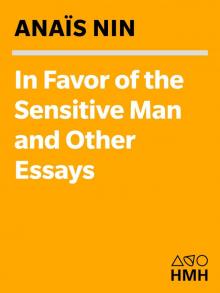 In Favor of the Sensitive Man and Other Essays (Original Harvest Book; Hb333)
In Favor of the Sensitive Man and Other Essays (Original Harvest Book; Hb333)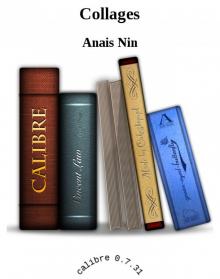 Collages
Collages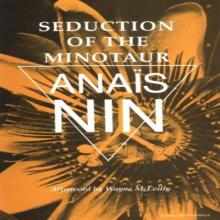 Seduction of the Minotaur
Seduction of the Minotaur Children of the Albatross
Children of the Albatross Delta of Venus
Delta of Venus The Four-Chambered Heart coti-3
The Four-Chambered Heart coti-3 Diary of Anais Nin, Volume 2
Diary of Anais Nin, Volume 2 Diary of Anais Nin, Volume 1
Diary of Anais Nin, Volume 1 Diary of Anais Nin, Volume 4
Diary of Anais Nin, Volume 4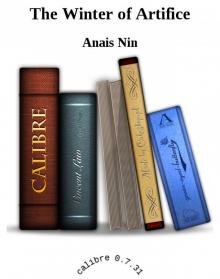 The Winter of Artifice
The Winter of Artifice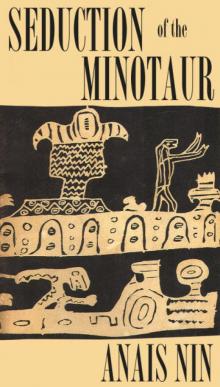 Seduction of the Minotaur coti-5
Seduction of the Minotaur coti-5 Children of the Albatross coti-2
Children of the Albatross coti-2 Henry and June: From A Journal of Love -The Unexpurgated Diary of Anaïs Nin (1931-1932)
Henry and June: From A Journal of Love -The Unexpurgated Diary of Anaïs Nin (1931-1932) Ladders to Fire
Ladders to Fire House of Incest
House of Incest